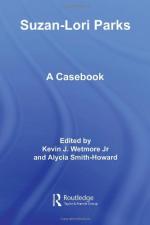|
This section contains 6,239 words (approx. 21 pages at 300 words per page) |

|
SOURCE: Brown-Guillory, Elizabeth. “Reconfiguring History: Migration, Memory, and (Re)Membering in Suzan-Lori Parks's Plays.” In Southern Women Playwrights: New Essays in Literary History and Criticism, edited by Robert L. McDonald and Linda Rohrer Paige, pp. 183-97. Tuscaloosa: University of Alabama Press, 2002.
In the following essay, Brown-Guillory examines Parks's use of repetition, revision, and relocation to create an African-American historical identity. Brown-Guillory also notes that many of the themes of the tetralogy Imperceptible Mutabilities in the Third Kingdom are further developed in Parks's later plays.
Since the mid-1980s, the two-time Obie Award-winning Suzan-Lori Parks has revolutionized Black women's theater tradition with her plays. In some ways, Parks's plays resemble the mutative and vertiginous stage poetry of Adrienne Kennedy's Funnyhouse of a Negro (1962) and of Sonja Sanchez's Sister Son/ji (1969), both of which experiment with language and theatrical space and, in effect, reconfigure the boundaries of the American stage...
|
This section contains 6,239 words (approx. 21 pages at 300 words per page) |

|


